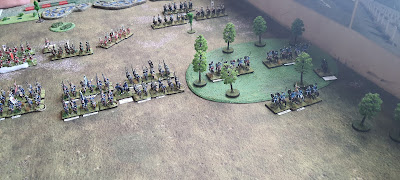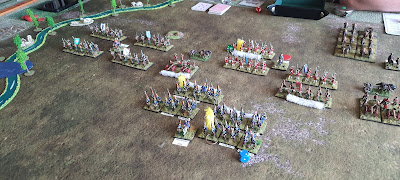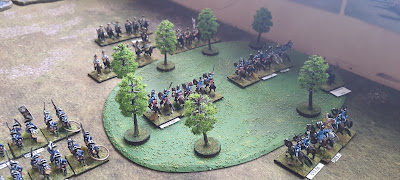As usual, le Duc is busier than the proverbial dog with the proverbial double appendage...
Showing posts with label Steinahhh!. Show all posts
Showing posts with label Steinahhh!. Show all posts
Saturday, 3 June 2023
Monday, 31 December 2018
Ramilles - part Deux
Here's the takeaways vis a vis FoB & Die Fighting.
- FoB was more dynamic. That's not to say 'gamey' as such, but everything made sense, in the same way, but the drama was heightened. There were more nail-biting charges, more un-predicted reversals, more lethal volleys combined with heroic attacks, and ill founded moves that could be recovered from. It still wears down your army - but not at the expense of having to manage the rules.
- The British attack was foiled, and pushed back. A French counter followed, with local counter attacks on both flanks. With too much resource management, we'd have spent our time counting chips rather than doing something stupid/heroic...or both.
- Some discussion on - when a commander is lost in FoB, everything under him goes out of command, which can be detrimental to effectiveness - St.Ruth at Aughrim and the collapse of the Jacobite flank echoes this. I can read an a account of a battle and immediately ascribe a rule mechanism from FoB to it. Though there is management of resource in other rules, they just don't seem to ascribe a narrative the way FoB does.

- I can attack, get beaten back, rally and attack again in FoB. The cost is my overall army morale, but I know that will ebb down - and that's my narrative - making the enemy ebb down quicker. Isn't that a battle?
- Now there is management of resource 'by command' in DF as opposed to the army morale in FoB - but it still works as a ready reckoner of force staying power - and you still have chances to stay and fight thanks to the Army Morale roll.
- Granted - and by virtue of the same mechanism, weaker units can bleed your army morale rapidly - but, using your militia wisely (in AWI for instance), or making allowances for them in the resource pool, can help this.
To the pics (with Sgt Steiner's excellent 10mm Marlburian stuff):
The Allied centre.
Allied Left.
Immediate action there!
The allies come off worst in initial charges.
...and sometimes disappear completely (a 1 is never good).
...prompting the allies to protect their flank for the rest of the battle.
Strong French centre.
French mass on the Allied right.
...pull back to the crest boys...
The French attack on the right, supported by cavalry. The British troops are the cream of the army, but won't fare well.
Bold moves in the centre.
Allied troops rout on the right after a successful French assault.
...with some cavalry success...
The left flank holds.
Both sides battered - artillery was particularly effective.
Great to compare the two sets. FoB always a winner though.
Subscribe to:
Posts (Atom)
























































